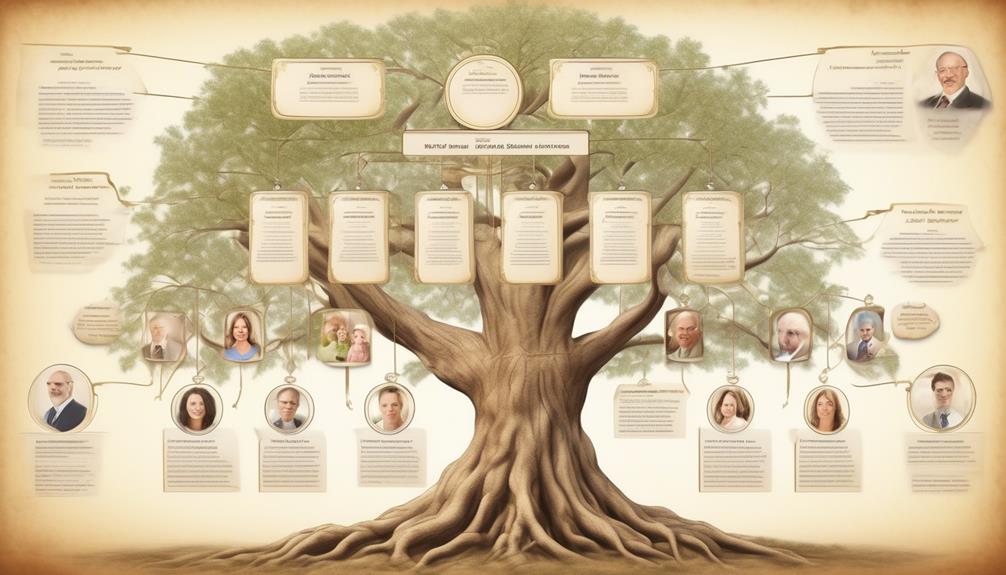As we journey through life’s obstacles, we often encounter the responsibility of handling the current responsibilities while also planning for the unpredictable future, all while finding a harmony between what is familiar and what is new. In the realm of estate planning, preserving this balance is crucial for protecting our inheritance and ensuring the future prosperity of our loved ones.
However, the intricacies of estate planning can be daunting, leaving many uncertain about where to begin or how to proceed. In this guide, we shed light on essential strategies and tools that can provide clarity and direction in safeguarding what matters most.
Key Takeaways
- Estate planning safeguards assets and ensures smooth distribution.
- Tax planning minimizes tax burdens and maximizes benefits.
- Regular updates and reviews are crucial for an effective estate plan.
- Essential documents like wills, trusts, and directives ensure proper planning.
Estate Planning Fundamentals
In understanding Estate Planning Fundamentals, we meticulously lay the groundwork for managing and preserving assets to ensure the realization of our wishes and the well-being of our beneficiaries both during and after our lifetime. Estate planning is a comprehensive approach to financial planning that involves legal considerations to safeguard assets and ensure a smooth distribution process.
Key components such as wills, trusts, healthcare directives, and powers of attorney play pivotal roles in this process. Wills are essential legal documents that outline how assets are to be distributed upon one's passing. Trusts offer a way to manage and distribute assets while providing flexibility and privacy. Healthcare directives specify medical preferences in case of incapacitation, and powers of attorney designate individuals to make decisions on our behalf.
Key Components of Estate Plan

Having established the foundational aspects of Estate Planning Fundamentals, it's imperative to now focus on the Key Components of an estate plan that are essential for ensuring the effective management and distribution of assets in line with our wishes and intentions.
When crafting a comprehensive estate plan, key components to consider include:
- Wills and Trusts: These legal documents specify how assets will be distributed upon one's passing, ensuring that your wishes are carried out effectively.
- Advance Healthcare Directives and Living Wills: These documents outline your medical care preferences and appoint a healthcare proxy to make decisions on your behalf in case you're unable to do so.
- Powers of Attorney: Granting legal and financial authority to a trusted individual ensures that your affairs are managed appropriately if you become incapacitated.
Including these components, along with proper financial planning, living trusts, asset management, and tax planning, under the guidance of an estate planning attorney, will help create a robust estate plan that safeguards your legacy and protects your loved ones.
Tax Planning Strategies
Implementing strategic tax planning is essential for maximizing benefits and minimizing tax burdens in estate planning. Understanding key aspects such as the estate tax exemption, currently set at $11.7 million per individual in 2021, is crucial for structuring an effective plan.
Gift tax considerations play a significant role in minimizing tax burdens and maximizing benefits for beneficiaries, requiring careful navigation of gift tax rules. The generation-skipping transfer tax, which applies to gifts and inheritances spanning multiple generations, necessitates attention to separate exemption amounts.
Proper asset valuation methods are paramount for accurate tax planning and compliance with estate tax regulations, ensuring a smooth process for all involved parties. Leveraging charitable giving benefits can't only reduce estate tax liability but also support meaningful causes, leaving a positive legacy.
Common Mistakes to Avoid

To safeguard the integrity of your estate plan and prevent potential complications, it's crucial to be aware of and avoid common mistakes that could undermine your legacy. When it comes to estate planning, overlooking key aspects can have far-reaching consequences. Here are three critical mistakes to steer clear of:
- Neglecting Regular Updates: Failing to review and update your estate plan regularly can lead to outdated beneficiary designations and ineffective asset distribution strategies.
- Ignoring Tax Implications: Not considering the tax implications of your estate plan may result in unnecessary tax burdens for your beneficiaries, diminishing the value of the assets you intended for them.
- Forgetting Healthcare Proxy and Power of Attorney: Overlooking the necessity of appointing a healthcare proxy and establishing a power of attorney can leave crucial decisions in the hands of individuals who may not align with your wishes.
Essential Estate Planning Documents
When addressing essential estate planning documents, it's imperative to ensure that your legal affairs are meticulously documented and up to date. These documents include a Last Will and Testament, delineating asset distribution and guardianship arrangements for minor children.
Living Trusts offer increased control over asset distribution and can help avoid the probate process, providing a smoother transition of assets to beneficiaries.
Power of Attorney documents are crucial as they grant authority to an appointed individual to manage financial affairs should you become incapacitated.
Healthcare directives outline your medical preferences, ensuring that your wishes are known and honored during times of need.
Regularly updating and reviewing these essential documents is vital to account for life changes and maintain their effectiveness in safeguarding your legacy and loved ones.
Frequently Asked Questions
What Are the 3 Main Priorities You Want to Ensure With Your Estate Plan?
When it comes to our estate plan, our main priorities are:
- Ensuring our assets are managed and distributed according to our wishes,
- Providing for the financial well-being of our loved ones, and
- Safeguarding our legacy.
It's crucial to minimize complications for our beneficiaries and to feel at peace knowing our affairs are in order.
Ultimately, our goal is to protect our loved ones and ensure our wishes are honored.
What Are the 7 Steps in the Estate Planning Process?
Taking inventory of assets and liabilities is the first step in estate planning. This helps in understanding the overall financial picture and making informed decisions. Naming beneficiaries ensures that specific individuals receive assets according to our wishes. Writing a will is crucial to document how assets will be distributed and appoint guardians for minor children. Evaluating taxes helps in minimizing tax liabilities and maximizing the value of the estate. Appointing an executor is important to oversee the distribution of assets and ensure that the will is followed accurately.
These actions ensure that our wishes are clearly outlined, our loved ones are protected, and our legacy is preserved. By following these seven steps, we can proactively plan for the future and minimize potential complications in the distribution of our estate.
What Is the Best Way to Leave Assets to Heirs?
The best way to leave assets to heirs is by utilizing a will or trust to clearly outline how assets will be distributed. This ensures that your wishes are carried out effectively and minimizes the likelihood of disputes among beneficiaries.
Why Do People Leave $1 in Will?
We leave $1 in a will for various reasons, such as symbolizing remembrance, preventing contests, expressing sentiments, ensuring legality, or showing appreciation.
This small gesture holds significant meaning, whether indicating a connection, safeguarding intentions, or extending respect and forgiveness.
The act of leaving $1 transcends its monetary value, serving as a powerful testament to our relationships and desires for our estate distribution.
Conclusion
In conclusion, estate planning is a crucial process for ensuring the protection of your assets and the well-being of your loved ones. By carefully considering key components such as wills, trusts, and tax planning strategies, you can create a comprehensive plan that safeguards your legacy for future generations.
For example, by establishing a trust for your children's education expenses, you can ensure that their financial needs are met even after you're no longer here. Plan ahead and secure your family's future today.









